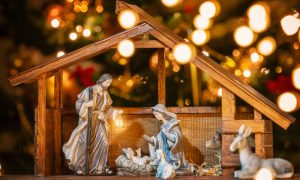Find the Winter Tide Newsletter here
(click on the link above)
Continue ReadingHoly Name Monastery
Founded 1889

December 5, 2022 (CNS) — Stopping to gaze at and perhaps pray before a Nativity scene is one of the best ways to remember the real meaning of Christmas, Pope Francis said.
“In its genuine poverty,” the pope said, “the creche helps us to rediscover the true richness of Christmas and to purify ourselves of so many aspects that pollute the Christmas landscape.”
Pope Francis met Dec. 3 with the artisans who carved the 18-piece Nativity scene in St. Peter’s Square; the donors of the white pine Christmas tree; the residents of a psychiatric rehabilitation center who, along with a group of students and grandparents, created the ornaments; and with representatives of the government of Guatemala, which set up another Nativity scene in the Vatican audience hall.
“Simple and familiar, the Nativity scene recalls a Christmas that is different from the consumerist and commercial Christmas. It is something else. It reminds us how good it is for us to cherish moments of silence and prayer in our days, often overwhelmed by frenzy,” Pope Francis told them during a midday gathering.
The group was scheduled to gather in St. Peter’s Square in the evening for the official unveiling of the Nativity scene and the lighting of the Christmas tree. But a major rainstorm with a forecast for more caused the Vatican to move the evening festivities indoors, although hundreds of people still were in the square for the lighting.
Meeting with the donors, Pope Francis encouraged everyone to find some quiet time to spend before a creche at Christmas.
“Silence encourages contemplation of the child Jesus,” the pope said, and “helps us to become intimate with God, with the fragile simplicity of a tiny newborn baby, with the meekness of his being laid down, with the tender affection of the swaddling clothes that envelop him.”
“If we really want to celebrate Christmas,” he said, “let us rediscover through the crib the surprise and amazement of littleness, the littleness of God, who makes himself small, who is not born in the splendor of appearances, but in the poverty of a stable.”
To truly encounter Jesus, the pope said, people must meet him in the manger, leaving their own vanity and pretense behind.
“Prayer is the best way to say thank you before this gift of free love, to say thank you to Jesus who desires to enter our homes and our hearts,” he said. “Yes, God loves us so much that he shares our humanity and our lives.”
“Even in the worst moments,” the pope said, “he is there, because he is the Emmanuel, the God with us, the light that illuminates the darkness and the tender presence that accompanies us on our journey.”
The lights on the Christmas tree, he said, are a reminder that Jesus came “to lighten our darkness, our existence often enclosed in the shadow of sin, fear, pain.”
But, the pope said, the tree also should make people think about the importance of roots.
Like a tree, he said, only a person who is “rooted in good soil remains firm, grows, matures, resists the winds that shake him and becomes a point of reference for those who look upon him.”
The Christmas tree, Pope Francis said, is a reminder of the need to remain rooted in Christ.
Continue ReadingContinue Reading
 This Third Sunday of Advent is familiarly known as Gaudete Sunday – a Latin word that means “rejoice” – the first word (in Latin) of the Entrance Antiphon at Mass: “Rejoice in the Lord always; again, I say, rejoice. Indeed, the Lord is near.” We mark Gaudete Sunday by lighting a rose-colored candle (in the Advent wreath) and the celebrant at Mass may wear rose colored vestments. The church rejoices because we are halfway to Christmas. I refer you to the First Reading from Isaiah: “The parched land will exult, will rejoice and bloom with abundant flowers, and rejoice with joyful song.” We are called to be a joyful people. The Promised One is approaching and is nearer at hand.
This Third Sunday of Advent is familiarly known as Gaudete Sunday – a Latin word that means “rejoice” – the first word (in Latin) of the Entrance Antiphon at Mass: “Rejoice in the Lord always; again, I say, rejoice. Indeed, the Lord is near.” We mark Gaudete Sunday by lighting a rose-colored candle (in the Advent wreath) and the celebrant at Mass may wear rose colored vestments. The church rejoices because we are halfway to Christmas. I refer you to the First Reading from Isaiah: “The parched land will exult, will rejoice and bloom with abundant flowers, and rejoice with joyful song.” We are called to be a joyful people. The Promised One is approaching and is nearer at hand.
I get the impression, though, in today’s early post-pandemic world that “joy” is on the decline. The theme of joy is a rare commodity. When someone asks: “How was your day?” We might hear ho-hum tones: “It was OK” or “Could have been better” or “I’m just so tired of doing the same thing every day.” Or “I’m exhausted.” Or “Don’t ask me.” To have joy is to have a deep sense of delight. The Greek origins of the word “joy” literally means “for the heart, in its deepest place of passion and feelings, to be well.” That’s what it’s like to have joy.
So why is joy so rare? To experience joy in one’s life, four qualities must co-exist. First, joy takes time. Joy comes of living a “savored” life. Take the time, make the time to smell the roses, to observe the pace of a sandhill crane crossing the street or to glory in a sunset or moonrise. There is an old monastic saying that describes joy. “When you are sipping tea or watering a plant, or gazing at an icon, do just that.” Be present in the moment. Such moments are pregnant with God’s real presence, promise and providential care.
Second, to know joy requires acceptance – a “yes” to life – YES to the hand we’ve been dealt. You may have discovered at some point that the script we’ve been handed in the play of life is not the part we thought we were trying out for. Joy requires a deep willingness to accept that we are God’s creatures and that God is at work according to God’s good pleasure. Joyful persons do not live in a state of resentment for what might have been or what “used to be.” In God’s plan, there is a reason why today is not tomorrow. We need each of our todays to prepare us to receive the promise of tomorrow. Remember the phrase from our COVID prayer: “We live in full union with the God who loves us and wants only our good.”
Third, for a joyful spirit desire is required. We have to want joy. Joy is a gift, a gift of the Spirit. If you want the gift of joy, ask God for the gift with your heart open and ready to accept the gift in whatever way God hands to the gift to you.
And, fourth, to be joyful we need stability, patience and endurance. Maybe that’s why Jesus says: “Truly I tell you… you will have sorrow… but your sorrow will turn into joy.”
Life for most people is not picture perfect. But there is much joy to be found if we simply LOOK for JOY. Be on the lookout to SEE and REFLECT the JOY that is right before your eyes waiting to be seen. The more we dwell on our everyday blessings, the more joyful moments seem to multiply in our lives. And by experiencing more joy in my own life, I have more JOY to give away. To quote Henri Nouwen: “Joy does not simply happen to us. We have to choose joy and keep choosing it every day.” JOY is a beautiful gift to embrace, celebrate and give away at Christmastime.
~by Sister Roberta Bailey, OSB
Continue Reading

Periodically the Benedictine Sisters of Florida solicit contributions to a project that they have discerned to support.
We are collecting for the Franciscan Poor Clare Sisters, San Damiano Monastery in Fort Myers Beach, Florida that was destroyed by Hurricane Ian.
To make a contribution, write check payable to Benedictine Sisters of FL – note for Advent Outreach Project – we’ll send lump-sum donation to the project. Or you may donate through our website (link below). Be sure to select the “Advent Outreach” designation.
 Over the next few days in our Advent journey the church invites us to consider John the Baptist’s relationship to Jesus. John appears in the tradition of the great prophets of Israel, preaching repentance and reform. In fact, the description of John found in this reading is reminiscent of the description of the prophet Elijah. John words are not directed only to the Pharisees and Sadducees. John’s message is a pointed call to repentance aimed in our direction: “Repent, for the kingdom of heaven is at hand!”
Over the next few days in our Advent journey the church invites us to consider John the Baptist’s relationship to Jesus. John appears in the tradition of the great prophets of Israel, preaching repentance and reform. In fact, the description of John found in this reading is reminiscent of the description of the prophet Elijah. John words are not directed only to the Pharisees and Sadducees. John’s message is a pointed call to repentance aimed in our direction: “Repent, for the kingdom of heaven is at hand!”
John makes very clear that his relationship to the Messiah is one of service and subservience: “The one who is coming after me is mightier than I. I am not worthy to carry his sandals.” The highlight of John’s ministry was the fantastic success he enjoyed way out in the wilderness. This man does not care what people think. And his style worked! He certainly was no fashion plate, with his camel hair clothing, leather sandals and the cincture around his waist. His diet was simple: locusts and wild honey. This note must have been important to the evangelists, or it wouldn’t be included in their Gospels. It is symbolic. You can’t wear anything more simple in the way of clothing, or eat a more basic diet. John’s ministry, and our inheritance, is one of very simple beginnings.
But what does it say to us? What is God, the Divine architect, designing and constructing in our lives? When our life’s valley is filled in and the road made smooth, the crooked straight, will we be ready to “see the Son of Man coming in a cloud?” As we approach the off-ramp of life, will we be attuned to the divine whisper that is familiar from our daily Lectio? Will we hear clearly the voice of the One crying out to us? Will we stand erect and call to others: “Look! The salvation of our God is at hand?”
What will it take to raise our weariness to consciousness, and conscientious attention to those with whom we live? What will it take to crack the ridged set in our ways? How many hosing-downs does it take to quiet a hot temper or a sharp tongue? How can we remove our spiritual cataracts so we can see the bigger picture? What kind of corrective lens do we need to protect our eyes from worldliness? What strength of binoculars will it take to zero in on the faulty behavior we what to eradicate? What kind of safe-guards will we need to keep us on the straight and narrow? Is our prayer life regular enough, strong enough, secure enough to protect us from inevitable temptation?
No matter how we might like to think that we’ve got it all together, sooner or later we all need to have a maintenance check-up and a little divine repair job. When a hurtful word slips through our lips or cares and daily concerns erode our promised Lectio time; when we are battered by life’s challenges, God promises to strengthen the areas of weakness that plague us. Our God promises to fix what’s broken in our lives.
Paul reminds us in the Second Reading: “Whatever was written previously was written for our instruction, that by endurance and by encouragement you may think in harmony with one another … that with one accord in one voice you may glorify God.” John’s message prepared the way for Jesus in the first century. We are called to be prophets in today’s world. Each of us has a mission to communicate Christ’s message of hope, freedom, and peace; to help people fill in their valleys and make their rough paths more smooth. “Prepare the way of the Lord, make straight his paths: all shall see the salvation of our God!”
~by Sister Roberta Bailey, OSB
PO Box 2450
12138 Wichers Road
St. Leo, FL 33574-2450
(352) 588-8320
(352) 588-8443
